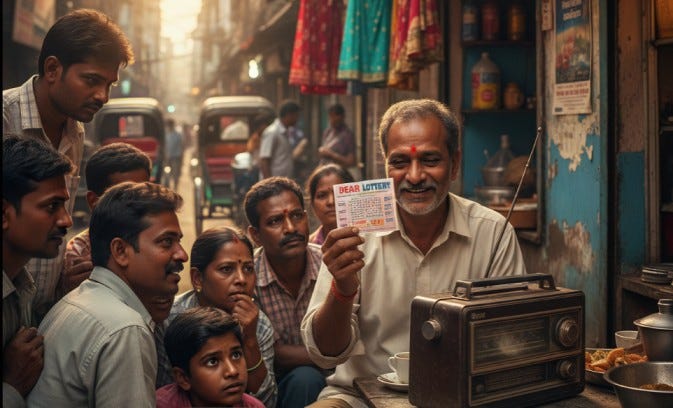Dear Lottery: India’s Eternal Gateway to Dreams
Discover Dear Lottery – India’s timeless gateway to dreams, trust, and hope. A government-backed lottery uniting tradition, luck, and life-changing prizes.

When it comes to luck, suspense, and the joy of chasing fortune, few names shine as brightly in India as Dear Lottery. For more than half a century, this government-backed lottery has carried not only the promise of wealth but also the spirit of tradition, community, and hope. It is far more than just a piece of paper it is a symbol of possibilities, cherished across generations.
From the crowded tea shops of Kolkata to the serene valleys of Nagaland, the name “Dear Lottery” carries a familiar ring. To millions, it is a ritual, a festival of anticipation, and a reminder that destiny can change in a heartbeat.
A Beginning with Purpose
The story of Dear Lottery began in the 1970s, not as a pastime but as a mission. The Nagaland government launched it to raise funds for public welfare and development projects. What was once seen as a revenue initiative soon blossomed into a nationwide craze.
While many private lotteries rose and disappeared in a haze of mistrust, Dear Lottery endured. Its foundation was built on transparency and credibility. In the early days, people would gather around radios or scan newspapers for the hand-written winning numbers. Today, digital platforms deliver instant updates, binding together a farmer in Assam and an office worker in Delhi in the same electrifying moment of suspense.
Trust That Withstood the Test of Time
In a world where lotteries often face questions of legitimacy, Dear Lottery has become a name synonymous with fairness. Each draw is conducted under the strict supervision of the Directorate of Nagaland State Lotteries, leaving no room for manipulation.
The thrill is multiplied by its structure: three daily draws — afternoon, evening, and night each with unique and charming names like Dear Pelican or Dear Godavari. Affordable ticket prices ensure accessibility for everyone, from students to small shopkeepers. Thousands of participants walk away with smaller wins each day, spreading joy beyond just the jackpot winners. This sense of inclusivity is one of the biggest reasons for its lasting appeal.
A Cultural Ritual, Not Just a Game
For many families, Dear Lottery is more than chance it is a tradition woven into their daily lives. Morning draws symbolize new beginnings, evening draws bring comfort after a day’s work, and the night draws create suspense-filled gatherings at home.
Some households have even passed down lucky numbers and cherished series from one generation to another. These rituals transform what might appear to outsiders as mere gambling into something deeply cultural — a shared belief that luck can smile at anyone.
Fair Rewards, Clear Process
Dear Lottery has earned unmatched loyalty because of its simple and transparent prize claim process. Small winnings can be collected directly from local authorized sellers. Larger prizes are routed through official government channels, with proper ID verification and tax deductions, ensuring everything happens under the law.
Unlike fly-by-night operators, Dear Lottery builds trust by ensuring winners receive what they deserve. For participants, this is not just about money — it’s about faith in a system that respects fairness.
Beyond Wealth — The Symbol of Hope
What sets Dear Lottery apart from countless other lotteries is its emotional value. Across states like Nagaland, West Bengal, and Kerala, stories of winners have become family folklore, narrated across generations. For many, buying a ticket is not merely a pursuit of riches but a way of keeping a cherished tradition alive.
Even those who never win often continue playing, not for loss or gain, but because the act of holding a ticket carries dreams within it. Every slip of paper is like a folded wish, filled with anticipation.
Safe, Responsible, and Accessible
Unlike private lotteries that often exploit vulnerable participants, Dear Lottery emphasizes responsible play. With low ticket prices, players never have to risk their stability. Because it is government-backed, families view it as safe entertainment, far removed from reckless gambling.
This balance of fun and responsibility is one of the reasons why even conservative households embrace it. In villages and towns, elders often encourage the younger generation to buy tickets “for luck,” treating it as a harmless tradition rather than a risky gamble.
An Evergreen Legacy
The real magic of Dear Lottery lies in its timelessness. It has adapted with the ages — moving from radios and newspapers to mobile phones and websites — without losing its essence. Even today, when the winning numbers are read aloud, the same heartbeat quickens, the same suspense builds, and the same dreams flicker in the eyes of players.
Ultimately, Dear Lottery is not just about jackpots or headlines. It is about hope, culture, and the belief that luck is never far away. Whether it’s a first-time player or someone carrying forward a decades-old habit, the charm remains unbroken.
And that is why, fifty years on, Dear Lottery continues to be India’s eternal gateway to dreams — a bridge between everyday life and extraordinary possibilities.